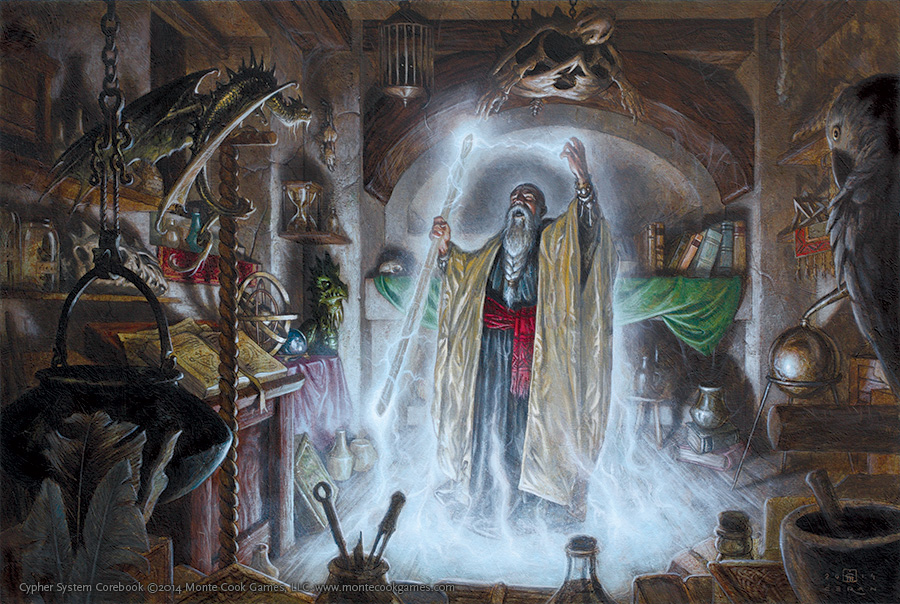This is the ninth in a series of articles by Monte about designing, running, and playing the Cypher System. You can read the first one here.
In many ways, cyphers are the most important aspect of the Cypher System–hence the name. Cyphers are one-use abilities that characters gain and use over the course of the game. They set the game system apart from others because a character’s abilities can change from session to session, always keeping things fresh. They are abilities granted by the GM, but utilized by the player, making them a perfect synthesis of narrative control.

One of the most difficult issues of game balance is introducing new PC abilities. It’s not enough to think about what it will be like if a PC turns invisible once, you have to think about what effect it will have that the PC has the ability to turn invisible all the time. Maybe even every encounter. But cyphers, being one-use, don’t cause this problem. Sure, a PC might end up with the ability to take down one really tough challenge with the flip of a switch, but that’s just one challenge of many that the PC will face. It’s fun, it’s invigorating, but it’s not unbalancing.
When I was young, I played in wild-and-wooly D&D games where we liberally gained and used abilities not from the rules, but stolen from comics, movies, books, and our own crazy imaginations. It was crazy and sometimes disastrous, but it was fun and always exciting. Cyphers are a way for the GM to interject literally anything into the game without worrying that the campaign will be ruined. Plus, they’re a way for a player to gain access to fun abilities without having to wait for months of game time to reach the level where it’s “appropriate.”
They lead to really fun game situations where a player gets to say, “well, I’ve got an X that might help in this situation,” and X is always different. X might be a bomb, a short range teleporter, or a force field. It might be a powerful magnet or an injection that will cure disease. It could be anything. Cyphers keep the game fresh and interesting.
Although in some genres, cyphers are a sort of “treasure” in the form of new gear (potions, high tech devices, etc.), it’s probably more apt to think of them as character abilities rather than gear. They aren’t “extra”—the game assumes that players will use them liberally, because there’s always more to replenish characters back to their cypher limit.
Cyphers fit seamlessly into most games with a supernatural element, or even high-tech options. But if you’re playing a game that doesn’t focus on “stuff” at all, you’ll want cyphers to be more ephemeral. They don’t have to be things at all—they can be blessings from the gods, whispers from the spirits, alien transmissions, or something like that. But if you’re playing a game where even that’s not an option—say, a modern day detective game—then you use a special subset called subtle cyphers. These cyphers not only do not have a physical presence, but they don’t have any overt effects, although they’re still very useful. A subtle cypher might represent your character simply gathering up her courage and thus reducing the difficulty of Intellect defense rolls for a time. Or maybe getting your second wind, and restoring some points to your pools. Subtle effects that fit into all genres but still give characters options to play with. Genre limitations need not keep players from experiencing the fun of cyphers and the ever-changing effects they have on their characters’ capabilities. And fun is really what it’s all about.
The Cypher System Rulebook hits stores in early August, but is available for pre-order now!